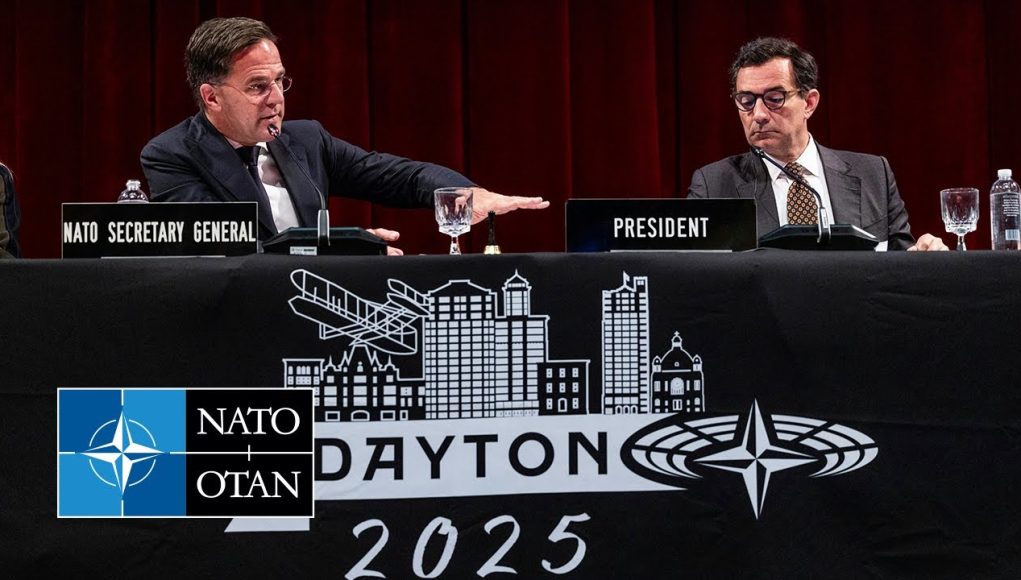Address
by NATO Secretary General Mark Rutte to the NATO Parliamentary Assembly, followed by a moderated conversation
Thank you Marcos, and thank you Andrii for your incredible leadership in Ukraine. And I think it was very important to have that address today to this important gathering.
And thank you to Mike Turner and the whole US team for the warm welcome to Dayton.
First, I want to pay tribute to Gerry Connolly. He was a powerful advocate for our great Alliance, a champion of the transatlantic bond and a fearless defender of the democratic values we hold dear. We met a couple of times. First when I was Prime Minister of the Netherlands, and then twice in my present role. And I have the best of memories of these encounters. And I can tell you also in private, he could be very forceful. Let us honour his memory by continuing to stand strong and united in NATO.
Despite these sad circumstances, it is a pleasure to join you this session of the NATO Parliamentary Assembly.
And to celebrate your 70th anniversary year.
The NPA promotes peace, security and democracy.
Strengthens transatlantic cooperation.
And builds understanding about our great Alliance.
You reinforce the bond between NATO and our democratic societies.
You have my admiration and deepest thanks.
I’m so pleased we are meeting in Dayton, a great city in the great state of Ohio.
And I was delighted to hear about the Dayton Dutch Lions, a local football team – or I suppose you in the United States would say “soccer”.
The Dutch philosophy for the “beautiful game” is all about strategic thinking, adaptability, and strong teamwork.
Today, I want to share with you how we are going to build a better NATO.
At the Summit in The Hague next month, Allied leaders will take decisions to make NATO a stronger, fairer and more lethal Alliance.
Because we live in a more dangerous world.
And this is a critical moment for our security.
With multiple threats and challenges.
There is Russia’s brutal war against Ukraine,
the threat of terrorism,
intense global competition,
and flashpoints points around the world,
from the Middle East to Asia.
Russia has teamed up with China, North Korea and Iran.
They are expanding their militaries and their capabilities. They are preparing for long-term confrontation.
I am struck by the speech Winston Churchill made in the House of Commons in 1936, when he asked the question:
“Will there be time to put our defences in order? …. Will there be time to make these necessary efforts, or will the awful words “too late” be recorded?”
Peace fails when there’s complacency,
when threats go unanswered,
and when preparations are put off.
We must take action now and build up our defences.
To delay is dangerous.
To make NATO stronger, we must increase defence spending – that underpins everything.
Allies will have to invest much more to meet new capability targets, which NATO Defence Ministers will agree in Brussels next week.
We need more resources, forces and capabilities so that we are prepared to face any threat, and to implement our collective defence plans in full.
Most Allies, if not all, are due to reach the initial aim of spending 2% of GDP on defence this year.
And many have already announced plans to go much further.
We know that the 2% pledge – agreed way back in 2014 – just doesn’t cut it any more.
So in 2025, we are finalising a plan to dramatically increase defence spending across the Alliance.
This plan will mean more money for our core military requirements – hard defence.
And more money for defence-related investments, including infrastructure and resilience.
I am working closely with Allied leaders as we prepare for the formal decisions at the Summit in The Hague.
As parliamentarians, I need your help to make the case for higher defence spending with the public.
And to encourage your governments to keep up with their commitments.
And I know the debates about investing more in defence will be difficult in some parliaments.
And each of you will have an important role in building support to get budgets approved.
So I need – and NATO needs – your support.
As well as more defence spending, we need more defence production.
NATO’s aim is to enhance and expand the industrial base right across the Alliance.
We are committed to increasing defence production, fostering innovation, and removing barriers to cooperation.
The Summit in The Hague will send a clear demand signal to industry.
And we need industry to meet our ambition.
Increased defence production is not just good for our security, it is good for our economies too.
And I also expect Allies will spend more and better together on critical capabilities for our armed forces.
NATO must become stronger, fairer, and more lethal.
To make NATO fairer, we will rebalance the burden of our security, with all Allies contributing their fair share.
We all benefit enormously from the protection our transatlantic Alliance provides.
But it is vital that every member of this Alliance is pulling their weight.
And I am encouraged to see Europe and Canada stepping up with more defence spending.
A strong transatlantic Alliance is good for Europe, and good for the United States.
Becoming more lethal means strengthening our deterrence and defence posture, and providing our militaries with what they need to keep us safe.
So that no potential aggressor has any doubt about our resolve.
Rest assured – we will always be a defensive alliance.
But to protect our way of life, we will always do whatever it takes to prevent any aggression against us.
And if anyone dares to attack us, our resolve will be absolute.
To preserve peace, we must prepare for war.
Let us not ignore the lessons of history.
Dayton knows that peace can prevail.
It was here in 1995 that the brutal Bosnian War was brought to an end.
The Dayton Agreement laid the foundation for peace in Bosnia and Herzegovina.
NATO has supported peace and stability there, and right across the Western Balkans, for thirty years.
Our commitment remains just as strong today.
But above all, it is the people and politicians of Bosnia and Herzegovina – and throughout the region – that must deliver progress.
The Western Balkans has shown that peace is possible.
But today, Europe is not at peace.
Russia has brought war back to Europe.
Its aggression against Ukraine must stop – and it must stop now.
I completely condemn Russia’s indiscriminate attacks against innocent civilians over the last 48 hours.
We fully support President Trump’s urgent efforts to stop the fighting.
We need a just and lasting peace.
This is a priority that we all share.
NATO will continue our long-term support to Ukraine.
And this is not about prolonging the war, it is about ensuring Ukraine can defend itself now, and prevent any future aggression.
NATO’s command in Germany is leading the coordination of security assistance and training for Ukraine, delivering critical aid daily, and helping build its future force.
And our new centre in Poland is helping us all learn the lessons from the war.
So far, Allies pledged more than 20 billion euros in additional security assistance for Ukraine this year.
And through the Coalition of the Willing, led by the United Kingdom and France, NATO Allies have shown they are ready, willing and able to take more responsibility to help secure peace, when the time comes.
NATO has stood with Ukraine from the beginning.
We stand with Ukraine today.
And we will stand with Ukraine throughout the challenges ahead.
We know that even when the war against Ukraine ends,
the threats we face will persist.
Our adversaries will still try to dominate and divide us.
They will fail.
Because of the unbreakable transatlantic bond – North America and Europe standing together to secure peace through strength.
A stronger, fairer and more lethal Alliance is how we stay safe in a more dangerous world.
One billion people on both sides of the Atlantic are counting on us.
Let us rise to the challenge.
And stand strong together in NATO!




